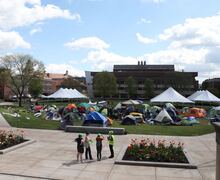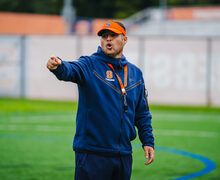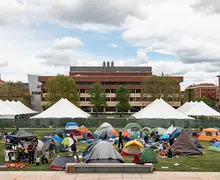SU, nation sees increase in religious apathy
All of the uncertainty Emily Kowalczyk felt about her religious beliefs showed in her body language. She paused, looked away and sighed.
‘I’m not really religious at all,’ she said.
Kowalczyk, a sophomore chemistry major, stopped practicing or caring about religion when she went away to college, she said. Kowalczyk said she doubts she is alone in her religious apathy at Syracuse University.
‘I don’t really get a religious vibe from other people,’ Kowalczyk said. ‘At least all the people I know aren’t really religious either, so I don’t think it’s as prominent.’
The number of students at SU that say they do not have a religious preference or do not declare a religion has steadily been increasing in the last several years, according to statistics from Hendricks Chapel. But religion professors, campus religious leaders and religious students said these numbers do not necessarily indicate a decreasing interest in religion.
In fall 2009, approximately 54 percent of SU students said they have no religious preference or did not list any religion, according to statistics collected by Hendricks Chapel when students enroll in the university. In 2002, however, only 41 percent of students said they have no religious preference or did not check any religion, according to Hendricks’ statistics.
National trends are also showing signs of religious apathy. Nineteen percent of Americans in 2009 said religion was not very important in their lives, according to a Gallup poll taken at the end of 2009. This represented an increase of 7 percent from 1992, when only 12 percent of Americans thought religion was not important in their lives, according to Gallup.
Another Gallup poll released Dec. 24 showed that 13 percent of adult Americans claimed no religious identity. In 1998, only 6 percent of Americans asserted no religious identity, and in 2002, 10 percent of Americans claimed no religious identity, according to the poll.
Gustav Niebuhr, director of SU’s Religion & Society Program, said that while religion is fundamental in American society, more and more people are describing themselves as unaffiliated with a specific religion.
‘The United States is a nation where religion is valued, and according to the basic annual surveys, 95 percent of Americans consistently affirm a belief in God or a higher power,’ Niebuhr said. ‘That doesn’t mean people are wildly pious, but it does mean religion is valued.’
Students who choose not to practice religion in college may do so for a variety of reasons, Niebuhr said. Some may decide it is time to take a break, others did not have religious families, while still others are simply too busy to practice, he said.
‘You come to college and there’s a menu of things you can do and ways you can spend your time, and no one’s going to question it,’ Niebuhr said. ‘There are some who are apathetic, but I don’t think that’s specific to religion.’
Even when students do claim a religious affiliation, for some that does not necessarily mean they care about religion.
Brian Van Ee, a freshman in State University of New York College of Environmental Science and Forestry, said he is Catholic but never practices. He said the only reason he considers himself Catholic is because he was baptized when he was born. Van Ee said he didn’t know what his personal beliefs are.
Many students who declare a religion on SU’s survey do so out of family tradition or to share information, not necessarily because they have an interest in practicing on campus, said Kelly Sprinkle, Hendricks’ interim dean.
But Sprinkle also said fewer students identifying with a certain religion may not be indicative of more religious apathy. Instead, they may experiment with multiple religions or decide to keep their religious preferences private, he said.
‘I think with college students in general, many would say they are very deeply spiritual people,’ Sprinkle said. ‘How they express that is probably the challenge. Sometimes this type of form doesn’t get the fluidity of that.’
When the Hendricks has a table at student activity fairs, Kelly said he sees a mix of interest in getting involved in campus religious life. Depending on what else is around the table, students either walk right by or show a great interest, he said.
Despite fewer students declaring a religion, some student religious organizations said they have seen an increase in membership numbers.
Adam Bernier, the president of the Campus Bible Fellowship, an Evangelical Christian group, said membership has increased from eight in 2006 to 18 in 2010. He attributed this to a high increase in interest from freshmen and sophomores, who constitute about half of the organization.
Friendship, more than a desire to practice religion, though, tends to draw people to the organization, Bernier said.
He said he sees mixed interest in religion throughout the campus, though people seem mostly uninterested in religion. When his organization has a table in Schine Student Center, it is either ignored or approached by those who already have an interest, Bernier said.
‘I don’t know if you can term that as apathy,’ Bernier said. ‘The majority of campus probably really isn’t interested that much. But I think the people who are active participants in religion are active in organizations as well.’
One setting where religious interest has increased is academically, said James Watts, the chair of religion department in the College of Arts and Sciences. A little more than 35 people are currently enrolled in the two majors the department offers, religion and religion and society, which represents about a one-third increase over the last five years, Watts said.
Majors tend to represent professional interest over personal belief, though, Watts said. The increased interest may be the result of more promotion of the classes, he said. It may also be because of an increase in interest in understanding different religions, especially Islam, in light of events with religious undertones such as Sept. 11, he said.
‘I’m not too sure about trends,’ Watts said. ‘The odd thing about the U.S. is that it’s been consistently a highly religious country from the beginnings to the present, and the complexion of that is changing, but the underlying religiosity of the population doesn’t seem to very much.’
Published on February 15, 2010 at 12:00 pm




